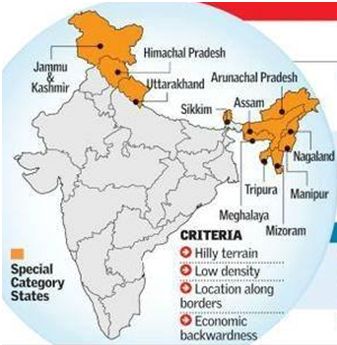Special Category status:
- The concept of SCS was first introduced in 1969 by Fifth Finance Commission.
- It has been not mentioned in Constitution.
- The rationale for special status was that certain states were historically disadvantaged in contrast to others, because of their inherent features, low resource base and cannot mobilize resources for development.
- The decision to grant special category status was earlier with former Planning Commission body called the National Development Council (NDC).
- NITI Aayog, which had replaced Planning Commission has no power to allocate funds for states falling under this category, therefore, now it is discretion of ruling party at Centre to dole out special favours to states.
What are the parameters?
Earlier, NDC accorded this status to states having
- Low resource base, hilly & difficult terrain
- Low population density or sizeable share of tribal population
- Backwardness, border states/ sharing the international border
- Economic & infrastructural backwardness
- Non-viable nature of state finances
The 14th Finance Commission also had recommended variables such as “forest cover” for devolution, with weightage of 7.5 in criteria to benefit north-eastern States.
What Special Category States have in common?
They are special in the sense that they have special socio-economic, geographical problems, high cost of production with less availability of useful resources and hence low economic base for livelihood activities. States under this category have low resource base and are not in position to mobilize resources for their developmental needs even though their per capita income may appear high.
Which States are categorised as SCS?
Assam, Jammu and Kashmir, Nagaland, Arunachal Pradesh, Manipur, Sikkim, Himachal Pradesh, Meghalaya, Tripura, Uttarakhand and Mizoram. (Total

What are the benefits these states get?
- The Planning Commission used to allocate funds to states through central assistance for state plans. Central assistance can be broadly split into three components
- Normal Central Assistance (NCA)
- Additional Central Assistance (ACA)
- Special Central Assistance (SCA)
- NCA, the main assistance for state plans, is split to favour special category states: the 11 states get 30% of the total assistance while the other states share the remaining 70%.
- The nature of the assistance also varies for special category states; NCA is split into 90% grants and 10% loans for special category states, while the ratio between grants and loans is 30:70 for other states.
- For allocation among special category states, there are no explicit criteria for distribution and funds are allocated on the basis of the state’s plan size and previous plan expenditures.
- Allocation between non special category states is determined by the Gadgil Mukherjee formula which gives weight to population (60%), per capita income (25%), fiscal performance (7.5%) and special problems (7.5%).
- Special category states also receive specific assistance addressing features like hill areas, tribal sub-plans and border areas.
- Beyond additional plan resources, special category states can enjoy concessions in excise and customs duties, income tax rates and corporate tax rates as determined by the government.
Present position of Centre
- After establishment of NITI Aayog and recommendations of 14th Finance Commission, Central plan assistance to SCS States was subsumed in increased devolution of divisible pool to all States (from 32% in 13th Finance Commission recommendations to 42%).
- Many states such as Andhra Pradesh, Bihar and Odisha are craving for Special Category State status because of nature of benefits these states are getting.
- In response to demand of these states, Central Government held that 14th Finance Commission has effectively removed concept of Special Category States after its recommendations were accepted in 2015 and it has restricted it only to north-eastern and three hilly states.
Why in news?
- Bihar has implored Centre for granting Special Category Status for the state.
- Andhra Pradesh demanding SCS status.
- The 15th Finance Commission made it clear that it did not have the mandate to recommend grant of special category status (SCS) to States but assured that its recommendations would be “sympathetic and positive” as far as the needs of Bihar were concerned.